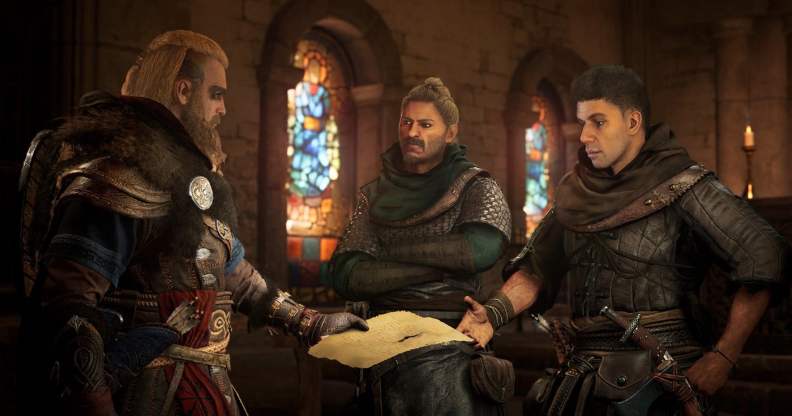Assassins Creed: Valhalla proves the Vikings were even better than drag queens at throwing shade

Assassin’s Creed Valhalla. (Ubisoft)
Valour, baldness, wit and…plow-swords – it’s all fair game for fierce jibes and insults in Assassin Creed: Valhalla’s shadiest minigame.
Flyting, as it’s known, sees your character Eivor trading reads in a battle of words and quips. They may not be in drag, but these queens love to throw shade.
This might seem unexpected and out of place in a historically accurate and brutal game. Stereotypically, Viking warriors are known for their bloodlust and gruesome violence, but they also valued honour and intellect. Flyting was a key part of their culture as a signifier of intelligence, wit and vocabulary.
In Valhalla, flyting is a minigame available in various towns across the map. When your male or female Eivor is challenged to flyting, you’re given a countdown to respond to insults thrown at you from a set list. Only the best will choose the insult that’s not only the most fitting response, but matches the rhyme and rhythm of the line before. It’s like reading, but more poetic. It will even bump your charisma, opening new dialogue options in conversations.
Throwing shade and reading of course began in the drag ballroom scene of the 1980s, where fierce drag artists would don their most fabulous outfits and insult one another for the pleasure of the audience. But there’s certainly a similarity with Valhalla’s Vikings.
So where does flyting actually come from?
The word itself stems from the Old English flītan meaning “to quarrel”, which itself comes from the Old Norse word flyta meaning “provocation”. Flyting was known to be practiced as early as the 5th century as a provocative insult exchange, but continued into the 16th century.
In Anglo-Saxon England, where Valhalla takes place, flyting was performed in feasting halls, with the winner decided by how rowdy the reactions of the crowd were based on the rudest, cleverest and most perverse insults. The prize for winning? More drink of course!
Later, in the 15th and 16th centuries, court flyting became a tradition in Scotland. Makars (a type of poet or bard) would trade insults for the entertainment of Kings James IV and James V, often with sexual and scatalogical themes. That was despite a harsh fine for profanities in public.
More specifically to Assassin’s Creed: Valhalla, the Norse gods regularly engaged in flyting, according to Old Norse poems. The poem Lokasenna, for instance, translates to The Flyting of Loki and sees the mischievous god essentially reading the others for filth. Another poem, Hárbarðsljóð, sees the ferryman Harbard (Odin in disguise) and Thor engaging in flyting.
There are numerous other examples of flyting in literature, perhaps most prominently in the epic poem Beowulf (which features in a special quest in Valhalla). The titular hero engages in a flyte with Unferth, thegn of Danish King Hrothgar, as a sort of test – spontaneous retorts being an example of intellect and ingenuity. Shakespeare, the shadiest of bards, also included examples of flyting and insult trading in his plays.
It’s not just Vikings though. Many cultures share similarities in insult trading, from the Japanese Haikai to the Arabic naqā’iḍ and the Nigerian game Ikocha Nkocha. So it seems there’s certainly a precedent for insult duels throughout history and culture. Reading one another is seemingly just something we humans naturally do.
Ubisoft have been painstaking in their recreation of medieval England and Viking culture, so it’s a welcome surprise to see flyting included in the game. Who knew Vikings could be so shady?
The library is open, officially.

